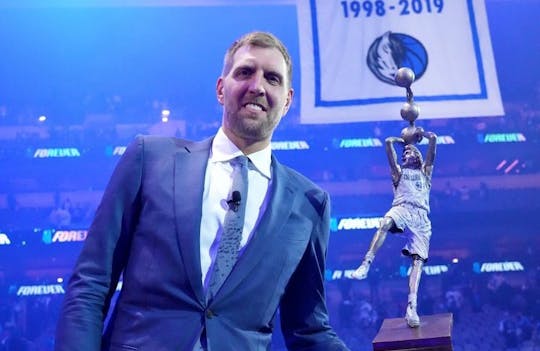Nobody saw Dirk Nowitzki coming.
International player meant something different before you came in,” NBA commissioner Adam Silver said to start Nowitzki's jersey retirement ceremony on Thursday (PHT).
Silver actually meant that before Dirk, no one took international players seriously. Tony Kukoc won three titles with the Chicago Bulls, but if you saw “The Last Dance” documentary, you found out that Kukoc wasn't exactly welcomed by his teammates. When Arvydas Sabonis came to the NBA in 1995, the Lithuanian was already 31 years old and already had a handful of surgeries in his basketball career. If you were lucky, you could have been respected for your unique style of play like the late Drazen Petrovic.
But there were no foreign superstars in the NBA. Hakeem Olajuwon was the closest the league had to that, but he had firm roots in the U.S. since he developed as a player there and eventually became a legend in Houston college hoops.
No one knew what to make of the lanky German kid who played pro hoops in Germany’s Division 1. Everyone looked at the sweet-shooting seven-footer wonder, mostly wondering if he could survive. The NBA that Dirk came into featured POWER forwards. Think big, bodybuilder types like Karl Malone, Charles Oakley, or Shawn Kemp. They played in the post and were expected to haul as many rebounds like a center.
Twenty-four years after Dirk was drafted, the ‘90s power forward model is nearly extinct. The position is barely even called power forward anymore. The position demands plenty of versatility – equal responsibility in and out the paint. This isn’t all because of Dirk. It takes a lot of force to leave a mark on the dry concrete that is NBA basketball.
Dirk, however, was a bulldozer.
The 2011 NBA Finals was one of the most momentous and arguably one the most important series in modern NBA history.
For a league that was threatened to be conquered by a dynastic superteam in the Miami Heat right after a lockout, the small market Dallas Mavericks winning their first title that year was massive for the NBA. Dallas had always had a passionate fanbase and ownership. They finally got a title.
That regular season and playoff run was Dirk’s magnum opus. They were supposed to be a playoff team, but a season-ending injury to starting forward Caron Butler derailed them. A month before the trade deadline, the Mavericks suddenly caught fire and surged to third in the West standings. They squeaked past the Portland Trail Blazers in the first round before sweeping Kobe Bryant and the defending champions Los Angeles Lakers in the following series. Then they eked out a five-game series win against the up-and-coming Oklahoma City in the Western Conference Finals.
The Heat, on the other hand, were in the first year of the LeBron-Wade-Bosh era. They steamrolled the East all season and barely broke a sweat in the playoffs… until they faced Dallas.
Dallas deserves credit for maximizing that team with Rick Carlisle’s sophisticated offensive system. But they achieved everything they did that season because of Dirk. At 33 years old, Dirk dragged that Mavericks team to the NBA Finals with averages of 28.7 points on 48.5 percent shooting, 8.1 rebounds, and 2.1 assists in the playoffs. He scored two 40-point games to close out OKC in the conference finals. In a series with LeBron James and Dwyane Wade, Dirk was the best player – an offensive jigsaw puzzle the Heat could not grasp.
Calling Dirk a stretch big man would be selling him short. In the 2011 playoffs, he was closer to how Kevin Durant plays now. No defender had the right combination of size and speed to stop him, so he found easy shots over and around defenses.
The defining image of that NBA Finals, and maybe even his career, was Dirk sneaking into the American Airlines Arena locker rooms right when the buzzer sounded at the end of Game 6. They had become champions and he was so overcome with emotion that he needed to cry in peace.
That 2011 season was probably Dirk’s last shot at validation. He came up in a Western Conference with fellow Hall of Fame forwards Tim Duncan, Kevin Garnett, and Chris Webber. He was great, but he wasn't considered on the same level as Duncan or Garnett as franchise players. It was mostly his fault, as well. In the 2006 NBA Finals, facing sophomore Wade and the Heat, Dirk faded in the last two games of the series and eventually lost the title.
We remember the 2007 “We Believe” Golden State Warriors fondly. Their legacy comes at the expense of Dirk’s lone MVP season. That Dallas team was the first top seed to lose a seven-game series to an eight-seeded team—a disappointing fact that would have probably been the biggest blow to Dirk’s legacy.
But Dirk became a champion. Along with him, he made a ragtag group of aging players, like Jason Kidd, Shawn Marion, Tyson Chandler, and Jason Terry, champions. Suddenly, those previous years of disappointment didn’t matter anymore. Dirk made Dallas a champion.
For a ceremony that was held after a game at 10:00 PM on a weekday in Dallas, Mavericks fans sure packed the American Airlines Center to watch Dirk’s 41 go up to the rafters. Did it help that they had just won a game against Golden State? Probably. But Dallas loves Dirk more than anyone – even more than any Dallas Cowboy past or present.
The accolades constantly repeated during the ceremony perfectly encapsulated Dirk’s impact on the NBA.
Everyone had to mention he compiled 31,560 points, which puts him in sixth on the all-time scoring list. No one knew what to do with Dirk when he came in. Now, every team is looking for their own sharp-shooting big man.
Everyone spoke about the fact that he played all 21 years of his NBA career for one franchise. No one has spent more time with one team than Dirk. He never gave up on Dallas.
The final thing everyone had to mention about Dirk was that he was foreign. The NBA has been growing internationally since the 1980s, but they never had a foreign ambassador like Dirk. He was everything a fan would want from their superstar – incredible at the game, cordial off the court, and fiercely loyal.
It’s easy to see Dirk’s imprint on the crop of international superstars that have blossomed in recent years. Giannis Antetokounmpo probably was inspired a little by Dirk’s loyalty to one team when he decided to re-sign early with the Milwaukee Bucks in the offseason right before they won a title. Reigning MVP Nikola Jokic not only shows flashes of Dirk’s game but also with how he approaches the minutiae of NBA superstardom. It was also probably destiny for Dallas’ next franchise player to be foreign. Luka Doncic was lucky to have Dirk by his side during his rookie year.
In true Dirk fashion, his jersey retirement speech was candid and funny. He spent all of his speech thanking everyone that helped him throughout his career – the various members of Dallas backend staff, Dallas owner Mark Cuban, former coaches, his family, and his longtime mentor Holger Geschwindner.
It’s tough to say there will never be another Dirk Nowitzki. He’s influenced not just how basketball is played but what the game should mean to a player. Dirk was driven by winning but was never bitter nor resentful. He took everything in stride and came out a legend.
#41Forever.#PhantomCam pic.twitter.com/YXbHWZAxWW
— NBA (@NBA) January 6, 2022




